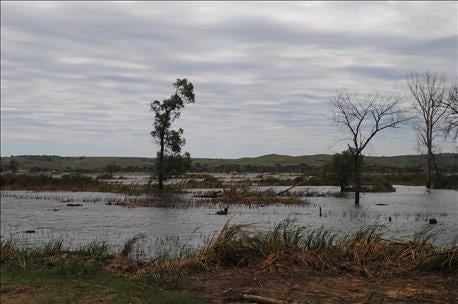
If you live and work on a farm or ranch this time of year, you are busy. You are so busy some days, you probably don’t know which way is up. Often, when we are busiest on the farm, we are just putting out fires, not really getting ahead of the workload.
There are days when everything goes wrong and it seems every possible piece of machinery that can break down, does. Those are the days when stress hits hardest. They are the days when we are most susceptible to farm accidents, because we might be frustrated and hurried.

RAIN, WIND AND MUCH MORE: Weather can be a major stressor on the farm that we can do absolutely nothing about.
Your doctor will probably tell you to avoid stress because it is bad for you. No kidding? But avoiding stress is next to impossible. On the farm, weather can be a major stressor that we cannot control. We may be able to prepare for weather challenges, but ultimately, we must roll with the punches when Mother Nature knocks on the door.
There are really only two ways to handle stress. You can meet it head on and learn to manage it without having a temporary mental breakdown, or you can permanently move to an island resort and plant yourself on a beach of sand somewhere.
Let’s look at the first option. Meeting and beating stress is one of the most important things we can do on the farm to manage a successful business. You and I both know that you can’t manage so bad things never happen. Bad things will always happen. However, the mental health experts will advise that you can work on a temperament that can handle almost any challenge that comes your way. It just takes practice.
One of the best ways to manage overwhelming stress is to break things up into manageable segments. If the cows are running wild down the road, your pickup has a flat tire, the grain auger is broken and you are late for your son’s ball game, it may seem like the world is crashing down quickly.
Related: If farming were a spectator sport
However, it is always best to take a deep breath and choose which one of these problems is life-threatening. If none of them are, you can relax, take another deep breath and decide which of these tragedies needs the most immediate attention. If the cows are out, that might be the one you choose to tackle first. Some things can wait until tomorrow, and others cannot. Prioritizing the wildfires in your business and personal life is the key to making small fires manageable.
If you can break things up into smaller tasks, tackle them one at a time or delegate responsibility to others on your team and hit several tasks at the same time, you are more likely to fix problems and alleviate the stress that comes along with them. At least that is what the experts say, but it sounds reasonable.
Putting things off and mentally piling all the challenges into one big mess can be counterproductive and quite destructive. I should know because that’s how I managed many of my challenges when I was farming full time. And, the results often were not very satisfactory. I’ve learned over time to break things up and hit them one at a time with the best of my ability. The outcome is much better. In this case, I would advise to do as I say, not as I do.
And as for the island resort, you realize that even life in a tropical paradise is nice for a short period of time, but it would get boring after a while. You want to be where the action is and the farm and ranch is definitely the place to be.
Be sure to follow local farm news at Nebraska Farmer online or on our Facebook page.
Bonus: There's no crying in farming
About the Author(s)
You May Also Like






